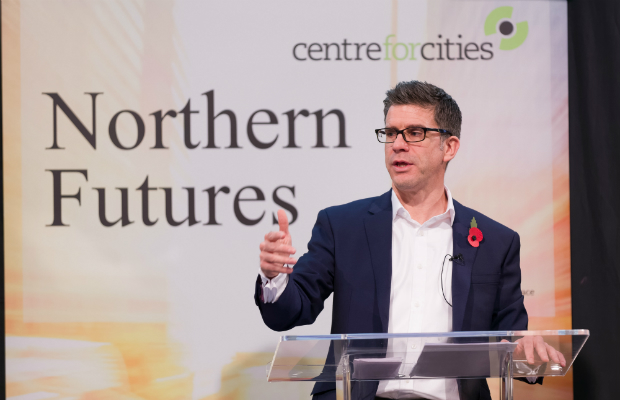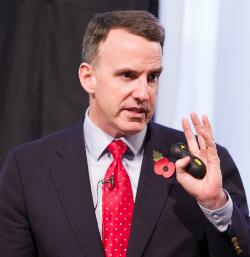
On 6 November, the Centre for Cities and the Deputy Prime Minister’s Office hosted the Northern Futures Summit in Leeds, marking the end of a period of public consultation to gather ideas on how best to stimulate economic growth in the north of England.
The event brought together over 300 delegates and a broad range of speakers - from local and national politicians and policy-makers, to local students, business representatives and leading academics. This included Professor Ed Glaeser, who flew in from Harvard University to deliver a fascinating keynote on global urbanisation.

Above the impressive line-up of speakers, however, it was the deliberative and inclusive format of the event that really made the day unique. The proposers of the most bold and innovative initiatives put forward during the consultation process were invited to deliver their pitches to a series of panels, which then debated and discussed each idea on its merits. All delegates were then able to vote for their favourite suggestions, with results shown in real-time in the room. This format took the conference beyond a ‘white tower’ discussion of the challenges facing northern city economies, to a positive, practical and locally driven discussion of the best pathway forward.
The event comes at a time when the topic of devolution has reached unprecedented heights of interest in the political agenda. Cities, and especially major city-regions or metros, are increasingly recognised as important drivers of growth. Indeed, the announcement of a major devolution settlement with a directly elected metro mayor for Greater Manchester earlier that week set the tone for a timely and lively debate of the measures required to ensure all cities in the north of England enjoy the freedoms and powers to support economic growth and greater prosperity.
First and foremost, speakers and delegates alike agreed on the important role that devolving certain powers away from Whitehall could play in stimulating growth in the north. And while issues such as the exact powers required at local level, and at which scale these should be held, did not necessarily all find conclusive answers, a number of key points emerged on the nature of devolution.
Devolution of powers must be accompanied by fiscal devolution
Without fiscal devolution, any new powers and responsibilities devolved to cities will prove an increased burden, and these areas will remain severely constrained in their ability to respond to local needs and grow their local economies. To fully bring about change, cities need to be able to control a larger share of the taxes that they raise locally, and also be able to raise their own funds - especially given the impact of current and future austerity policies on local government budgets.
Affording cities longer-term funding settlements was also highlighted as particularly vital. While short-term, and uncertain, funding streams can make local governments and investors alike unwilling to commit to major infrastructure projects, having 20 to 30-year funding models in place would give both councils and the market some much-needed consistency outside of political cycles, and enable cities to plan for future challenges and opportunities.
Any devolution process will, and should, be incremental and messy by nature
It is crucial to remember the opportunity to support local economies and more efficient public services should not be missed because of geographical rivalries and political differences. Local disagreements that come in the way of collaboration could mean the chance to take control is lost, and the system of ‘Whitehall knows best’ will inevitably continue.
Not all cities in the north possess the same appetite or readiness for change, and it does not make sense to force those furthest forward to wait while others catch up. A step-by-step process not only allows cities to take on more responsibility as they wish to, but may reduce Whitehall’s uneasiness about surrendering more powers to local areas. Manchester’s effectiveness at putting forward a strong argument for greater devolution is why the city-region was recently given additional powers, and why Leeds and Sheffield will follow - hopefully in time for the chancellor’s Autumn Statement.
Investment in transport and skills is critical to driving long-term economic success
On more specific policy areas, the coverage was broad and impressive. Reflecting the announcements by the Deputy Prime Minister that morning of increased funding for tourism in the north, and that the sub-standard rail links between Leeds and Manchester should be tackled as a priority, discussion touched on the role of public sector investment in the northern economy, as well as the relative benefits of inter- and intra-city transport. Improving job opportunities and skills, especially as a means to retaining a higher proportion of local graduates, also featured heavily.
Alongside a strong call for devolution of certain powers to the north, members of the conference were clear of the vital role that central government has to play, with recognition that Westminster is better placed to continue to manage certain critical policy areas, such as welfare and income taxes.
Conclusion
The overall message from the Northern Futures Summit was clear: the north of England, including its cities and rural areas, is culturally and economically significant in its own right, with a long and proud history and the promise of a brighter future.
It was a privilege to be involved in such a forward-looking and constructive event, which felt driven by both passion and pragmatism. The Centre for Cities looks forward to the next phase of progress towards the growth and empowerment of northern cities, and seeing some of the most inspired and visionary ideas of the day come to fruition. To achieve this, however, we need the current and next government to build on the encouraging interest in devolution we have seen over the past year through a commitment to genuine change. And we will need cities in the north to step up to the challenge of building on the strengths and attributes that set them apart, and to work together, rather than in competition, to ensure their voices are heard.
Images by Ollievision Photography courtesy of the Centre for Cities.
Sign up for email alerts from this blog, or follow us on Twitter.

1 comment
Comment by adam dawkins posted on
investment is key